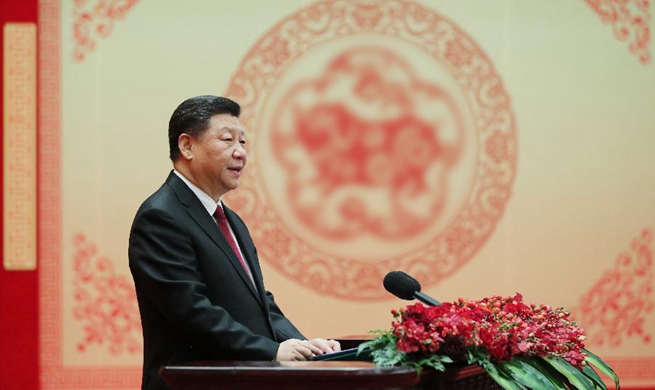TOKYO, Feb. 5 (Xinhua) -- Japan's opposition party camp on Tuesday, in ongoing parliamentary deliberations pertaining to the labor ministry's flawed jobs and wages surveys resulting in the release and use of erroneous statistics, has shown that last year wages dropped when the ministry reported otherwise.
Opposition party representatives, including President of the Democratic Party For the People, Yuichiro Tamaki, have, based on their own calculations, concluded that monthly real-term wages predominantly declined in the January-November period of last year.
This is in stark contrast to the official labor ministry's statistics showing that wages, ostensibly, rose in the same recording period.
Health, Welfare and Labor Minister Takumi Nemoto, whose resignation has been called for by the opposition camp to take account for his ministry's faulty labor surveys and shady internal data gathering methodology and accepted practices, conceded that the wages in the reporting period may well have declined, contrary to his ministry's data based on erroneous data gathering.
Nemoto is now under pressure from the opposition camp to justify the results of the wages calculations that were made following legitimate protocols in data gathering and calculations, only to say that the ministry is "looking into the matter with experts."
Yasuyuki Onishi, a director-general for statistics and information policy, was dismissed from his post on Friday by Nemoto, to account for his mishandling of the official governmental surveys.
The opposition camp, however, wants Onishi to appear in parliament as an unsworn witness to give testimony over the ordeal, which has led to diminished public trust in the labor ministry and the wider central government.
The opposition camp are strongly insinuating that there has been a monumental cover-up by the ministry and top bureaucrats involved in collecting, collating and releasing the key data on jobs, wages and benefits payments.
As the grilling ensued Tuesday, Tamaki urged Prime Minister Shinzo Abe to guarantee that due to the labor ministry's erroneous data collection methods and faulty data released, those who had not received their full unemployment and other related benefits be fully and properly reimbursed.
Abe on Tuesday again restated that the government will do its utmost to settle all the outstanding payments, but conceded that it has yet to fully get to grips with all of those whose payments have not been made.
Abe has previously vowed to conduct an independent probe into the flawed gathering of labor statistics that is continuing to dog the labor ministry and the government in general.
Abe, as upper house elections loom this summer and last year's as-yet-unresolved cronyism scandals remain fresh in the memory of the public, has apologized for the scandals and for undermining the public's trust and said that ongoing investigations would be conducted more objectively henceforth.
Kazuya Shimba of the opposition Democratic Party For the People, at an Upper House plenary session recently took aim at Abe for the labor ministry being allowed to investigate its own scandal.
Shimba said the government knew about the ministry's flawed gathering of labor statistics, but knowingly opted not to inform the public.
Shimba also claimed that the government had approved the draft budget for fiscal 2019 with knowledge of the scandal, yet chose to go ahead and release the erroneous figures anyway.
He added that many figures cited by Abe in his policy speeches could thus not be trusted and hence deliberations in the Diet on the draft budget had been utterly meaningless.
The embattled labor ministry has said it found flaws in a survey related to jobs and wages, with the scandal marking the second such time last month erroneous methods have been revealed to have been used to gather official governmental statistics.
The latest flawed survey, according to the labor ministry, has resulted in the ministry's basic statistics on wage structure being compiled using faulty methods and the calculation of minimum wages being incorrect based on the erroneous figures.
The ministry said that the particular survey, which purportedly aims to provide a clear gauge of wage payment and structure based on employment type or occupation, had seen ministry inspectors cut corners in collecting the key data, such as by not hand-delivering questionnaires to businesses and collecting them, and giving shortened deadlines to respondents.
Along with calculating minimum wages, the statistics are also vital in calculating income losses to those who have died in accidents, the ministry admitted.
The labor ministry initially came under fire for releasing faulty jobs and wage data spanning a period of a decade or more that resulted in more than 20 million people not receiving their full benefits.













